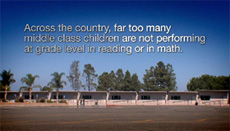Selections that we’ve highlighted over the years.
Is Teaching to the Test a Problem? It Depends…
Richard Phelps, author of the classic Kill the Messenger: The War on Standardized Testing, has written an article featured in the Autumn 2011 issue of the Wilson Quarterly. Among other things, he notes that “most of the problems with testing have one surprising source: cheating by school administrators and teachers.” Click here for more.
Test, Testing, and Genuine School Reform
In this 2011 book, one of America’s foremost scholars on what works in education discusses the proper role of testing in educational improvement, covering well-established principles of testing, current problems, and promising evidence-based solutions. Click here for more on the book or to order a copy.
A Teachable Moment: A New U.S. News Project Promises to Hold Colleges of Education Accountable, and the Colleges Don’t Like It

In this commentary from the Martin Center, Duke Cheston highlights a new project from US News and World Report and the National Center on Teacher Quality to rate teacher preparation programs, and the efforts of education schools to criticize or boycott such an effort. Includes comments from Dr. Stone of ECF.
Crazy U Highlights the Travails of the College Admissions Process
Author Andrew Ferguson chronicles his attempts to get his son into a top-flight college, all while questioning the value of the question he’ll ultimately receive. This is an insightful and thorough look at the frustrations of parents and the shortcomings of the admissions process. Order it here.
Brookings Institution Releases New Report on Using Value-Added Data to Evaluate Teachers
Evaluating Teachers: The Important Role of Value-Added, a report from the Brown Center on Education Policy at Brookings, addresses key issues in the use of value-added data and concludes that it has an important role to play in teacher evaluation. Go here for the complete report.
Confessions of a Misspent Youth
England’s Summerhill School is a residential version that was founded in the nineteen twenties. Click here to read a Newsweek essay by Mara Wolynkski, a writer and television personality who attended such a school as a child.
Standing and Delivering – What the Movie Didn’t Tell
In this book, Dr. Henry Gradillas, Jaime Escalante’s principal at Garfield High School, shares both his upbeat philosophy of education and the practical school management techniques that helped translate that philosophy into success for thousands of students over three decades. The book focuses on three areas that are key to the operation of an effective school: School climate, instruction, and curriculum. It includes many references to the Garfield experience, as well as to other schools where Gradillas was at the helm. See more, and buy the book, here.
“I read it on the plane coming back from Thanksgiving in California. I disturbed my wife and son with my frantic underlining and frequent exclamations of wonder and surprise.” – Jay Matthews , reviewing the book here
Pacific Research Institute releases “Not as Good as You Think”

Not as Good as You Think: The Myth of the Middle Class School is a documentary that shatters the myth that “good” schools located in “nice” neighborhoods are shielded from the education crisis that pervades schools in poor, urban areas. ECF president Dr. John Stone is featured in the film, which is currently available on DVD. See a trailer here, or purchase here.
LA Times features extensive report on value-added assessment
![]()
When Terry Grier joined San Diego USD as superintendent, he brought with him a desire to use value-added assessment in his school improvement efforts. Resistance by the education establishment to this and other initiatives led to his departure, and the conflict led the fourth largest newspaper in the US to report on the importance of value-added assessment in its print and online editions. The feature article can be found here
If standardized testing is such a valuable tool for school improvement, why do so many educators oppose it?

The key difference is one of perspective. Parents, policymakers, and the consuming public view public education as a human development resource. Their top priority is literacy, numeracy, and the other educational outcomes that prepare youth to be productive members of adult society. Educators want these same outcomes but consider a broad range of other objectives to be of equal or greater importance.
This conflict mostly stays below the public’s radar, but it occasionally bubbles up as a political battle between educators and elected officials about accountability.
Author Richard Phelps’ classic Kill the Messenger: The War on Standardized Testing describes the issue and analyzes the arguments that non-educators must understand in order to defend and advance the public’s educational goals.
J. E. Stone’s preface to the 2005 edition frames the issue and outlines the chapters.
Annual Growth, Catch-Up Growth

This book, referenced by Dr. Stone at the Value-Added Achievement Awards ceremony, details easy to replicate and proven methods used by one school district to assure student achievement in reading and math. Go here to learn more and to order this book.
See Direct Instruction in Action
Despite its proven effectiveness, Direct Instruction has not been universally accepted in education. Those familiar with the controversy, but unfamiliar with the method itself, may be surprised by how well-liked it is by parents and students. Go here to see DI in action in Gering, NE, and here to see how it works in the Fairfield-Suisun (CA) Unified School District. And go here to read an article on Project Follow Through, a decade-long research project that conclusively proved the effectiveness of direct instruction.
